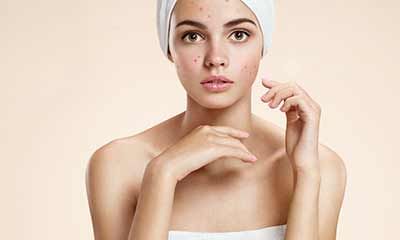Emotional Effects Of Acne!
How to manage the emotional effects of acne?
What is acne Vulgaris?
Skin conditions are commonly known to have psychological effects. Acne vulgaris is one such very common chronic skin condition that effects almost 80-85% individuals between puberty and 30yrs age. Acne is also commonly known as zits, pimples and comedones. Dark spots with open pores at the centre are known as blackheads. Tiny white bumps under the skin surface with no obvious opening are called whiteheads. They typically appear on the areas of the face, neck, upper back, chest and shoulder regions. It occurs in both males and females. However itâs more common in adult women.
Why does acne occur?
Our skin follicles are made of a hair strand and a sebaceous gland that secretes sebum (oil). This oil keeps our skin soft and lubricated. Whenever the pores of our skin get blocked, the lubricant mechanism is disturbed and it can result in acne. This can occur due to multiple reasons such as excess oil secretions, accumulation of dead skin cells in pores, in growth of hair, dirt and bacteria etc.
Risk factors for development of acne-
- Sugars/ carbohydrates rich diet e.g. Chips, bread etc.
- Hormonal changes specially during puberty and pregnancy
- Use of oil based make up and cosmetics
- Excessive stress, medications like steroids, ocp etc
- Family history of acne in parents
- Dandruff, oily skin etc.
What is the emotional impact of acne on women?
Poor self esteem and body image issues
Most women are sensitive and likely to experience the psychological impact of acne. The effects of acne can go far deeper than the skin surface. Acne most commonly occurs in adolescents and young adults, a phase when they are already undergoing physical, emotional and social changes. Itâs a time when females are most sensitive towards their bodily appearance. They tend to develop lower self-confidence and poor self image. Feeling of inferiority may get aggravated upon being teased or taunted and being scrutinised by others especially amongst college goers. Some embarrassed patients even avoid eye contact with others.
Affect academics / work problems / employment issues.
Skipping college due to acne outbreak to avoid embarrassment. Even some adults call it sick due to acne risking their employment. More people with acne are unemployed than those without. Owing to their lower self confidence at the time of interviews and also due to the potential reaction of the employers to their spotty face.
Affects interpersonal relationship and can cause social withdrawal
Fear of being negatively evaluated. They find it difficult to form bonds and establish relationships. Due to low confidence. They start avoiding any social contact which can get them any kind of attention. Avoid participating in sports and other social get togethers. The societal pressure of an ideal perfect skin causes a lot of stress especially among women. Lesser attachment and involvement with family and friends, they start isolating themselves from others.
How to identify negative feelings?
Women with acne experience a lot of distress and are more prone to develop depression, anxiety, mood disorder and even suicidal tendencies in severe cases. Important signs and symptoms to look for are:
- Low mood,
- irritability
- Unprovoked crying,
- lethargy
- Loss of appetite
- loss of interest
- Suicidal thoughts
- Sleep disturbances
- Ideas of being helpless,
- hopeless and worthless
- Social avoidance and withdrawal
- Sweating, tremors, palpitations,
- breathlessness spells etc
If you are facing any of the above symptoms, please seek professional help.
Where can you find support?
Struggling with acne can be difficult. However, managing it becomes easier with timely care and support. Seek the help of a dermatologist as acne can be treated. For the psychological and emotional difficulties like depression anxiety anger etc seek a psychiatrists help before it's too late. Spread awareness about it. Parents should educate their teenagers in advance about the expected physical changes and assure them with support that it's temporary and shall pass. Reassurance goes a long way. Schools and colleges should run awareness programs providing information about such common problems faced by adolescents. This will encourage more acceptance amongst students of those suffering from acne and help maintain their confidence level. Know that you are not the only one. Acne is a very very common condition.
Tips to keep your mental health in check
- Talk about your feelings to family and friends and deal with them in a healthy manner. Ask for professional help whenever you feel troubled.
- Maintain a healthy lifestyle. Eat healthy, keep fit and active. Drink responsibly. Don't embarrass yourself.
- Keep in touch with dear ones. Care for others. Meet them and make phone calls regularly. Social support is very important.
- Do something that you are good at. It builds self confidence and gives sense of achievement. Boosts self esteem.
- Take a break. A change once in a while from your regular stress is good for your mental health.
- Accept who you are.



+1.svg)
